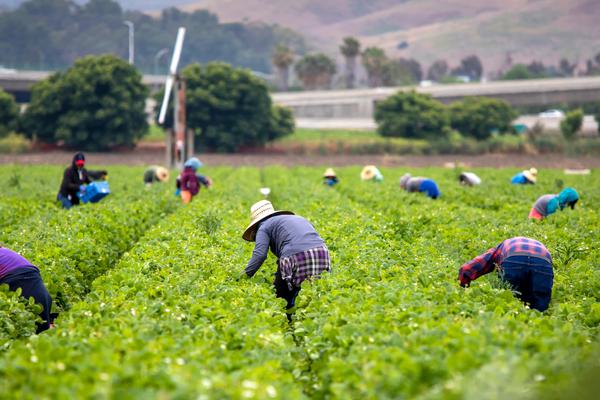UK Modern Slavery Bill: Will it protect, respect and ensure access to redress for workers?
14 October 2014

If I were to rate the current draft of the UK Modern Slavery Bill on the degree to which it will protect, respect and give access to remedy for workers, I’d give it 4/10.
Surprising, right?
The Modern Slavery Bill is the first of its kind, and the UK government’s commitment to being a global leader in tackling this crime is admirable.
So what’s the problem with the current Bill? Well, for starters, there is currently nothing in the draft legislation to tackle modern slavery in supply chains. Yet it is in the private economy – in manufacturing, service sectors, construction and agriculture – that most of the 21 million workers in forced labour or trafficking for labour exploitation are to be found. There is growing evidence that the scale and nature of this crime is increasing because it is hugely profitable. The ILO estimates the illicit profit in forced labour amounts to US $150 billion a year.
Civil society advocacy and anti-trafficking groups have been calling for better legislation for years on this, and you’d expect that.
But UK industry has also found the Bill wanting. Forced labour and trafficking for labour exploitation has, until the past couple of years received scant attention from policy makers and the public. But now it’s in the news daily. Consumers are calling on brands and retailers to remove from their shelves products of companies that have been discovered to have slavery in their supply chains. In managing their reputational risks and in ensuring that can better protect workers’ rights in their supply chains, companies want to see the government doing more to regulate industry.
The Bill classically falls under the ‘Protect’ pillar of the UN Guiding Principles on Business and Human Rights. But even with a ‘perfect law’ (whatever that might look like), the government’s ability to protect workers from modern slavery is a huge challenge. There are no quick and easy solutions. It needs a joined up approach within and across governments at local, national, regional and international levels – particularly because those most at risk are migrant workers.
But it also requires leadership and commitment by multiple actors working together to tackle the problem in the long term: governments, the private sector, civil society organisations and trade unions.
The question of accountability is paramount. That means we need to be clear about what the problem is – including which crimes are being committed under which laws; and who is accountable for what. Beyond the critical questions of legal instruments and definitions (which I won’t dwell upon here), let’s turn to the critical questions of ‘Respect’ for workers rights.
The UK retailers and brands that are members of the Ethical Trading Initiative ‘get’ the Respect agenda. They’ve signed up to ETI’s Base Code and choose to participate in our programmes and initiatives because they recognize the value of collaboration. They recognize that they will have a far better chance of addressing the critical risks in their supply chains by working with other companies in their sector or in a country, as well as with trade unions and NGOs to achieve mutually acceptable solutions.
But they also know that voluntary initiatives alone are not enough. They want government to help level the playing field. They want to avoid a race to the bottom in labour standards by being undercut by unscrupulous companies, suppliers and labour providers who don’t face the same degree of public scrutiny that they do.

Most of the 21 million workers in forced labour or trafficking for labour exploitation are to be found in the private economy – in manufacturing, service sectors, construction and agriculture.
That’s why they’ve been so vocal in calling on government for stronger legislation and regulation of the private sector in tackling modern slavery.
On the other hand, government officials and Ministers have been saying that they don’t want to place unnecessary burdens on businesses. They are keen to see the economy grow and don’t want it to be constrained by legislation and ‘burdensome reporting’. They think consumer pressure will force companies to do the right thing. They welcome voluntary initiatives and have been keen to help facilitate sharing of good practice.
UK industry representatives – mostly members of the ETI and the British Retail Consortium - have been meeting with government officials over the past few months to discuss the issue of modern slavery. They have been keen to share good practice and encourage others to do more to promote ethical trade and responsible business practices.
But they’ve also been clear in their messages: stop placing the sole burden of responsibility on UK retailers and brands: they’re not the bad guys here. Whilst they know they need to do more and can do a lot better, they are the easiest targets for consumers, campaigners and the media. But they are also right in saying that companies that operate under the radar, further down the supply chain are the biggest culprits of criminal and abusive labour practices. As such they want the government to help level the playing field.
We sent a very clear message to the Prime Minister a few weeks ago, asking him for three things in the Modern Slavery Bill:
- Require companies to be transparent and accountable for tackling modern slavery;
- Expand the role and remit of the Gangmasters Licensing Authority;
- Ensure an independent and enforcement role for an Anti-Slavery Commissioner that will ensure access to redress for victims.
This followed earlier letters to Secretaries of State in the Home Office, Department of Business, Innovation and Skills; written evidence to the Public Bills Committee, and letters to MPs and those in the House of Lords asking them to strengthen the Bill.
We’re hopeful this will be addressed in amendments to the Bill on 14th October when the Public Bill Committee meets. From there, it will be debated in the Commons and then in the Lords. This issue has significant support from MPs and Lords on all sides of the House.
Let’s hope reason and wisdom prevail, and that we will end up with a Bill that recognizes the critical role of government in protecting and supporting millions of workers who are victims of modern slavery in the UK and around the world.



